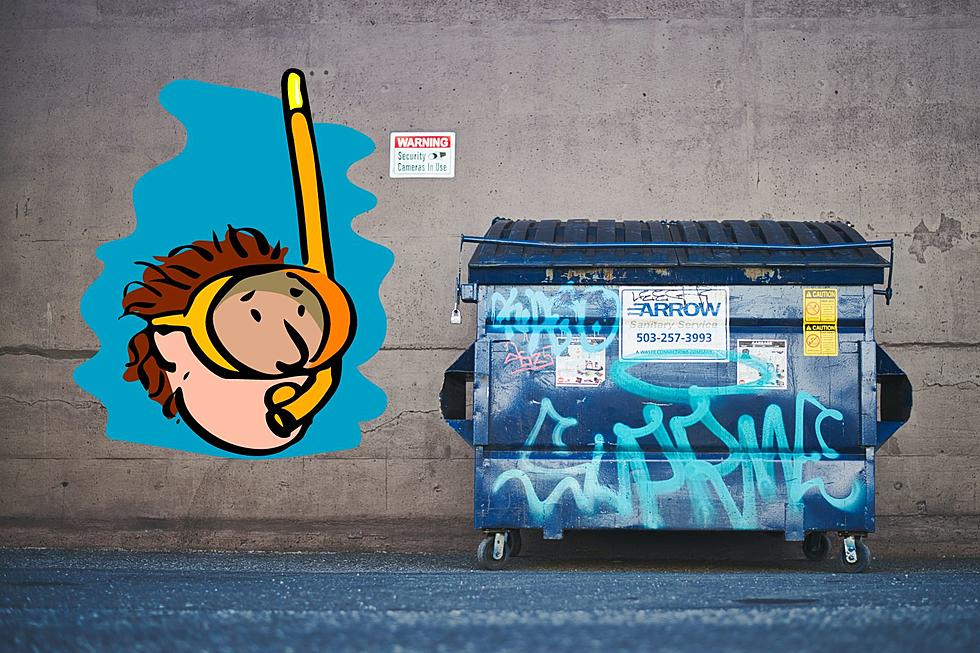Have you ever wondered if dumpster diving is legal in Massachusetts? Well, buckle up, because we’re about to dive deep into this topic—pun intended. Dumpster diving, or the act of scavenging for items in dumpsters or trash bins, has been a topic of debate for years. While some see it as a creative way to recycle and save money, others view it as a potential legal risk. So, let’s get the scoop on whether dumpster diving is illegal in Massachusetts and what you need to know before you take that plunge.
Massachusetts, like many other states, has its own set of rules and regulations when it comes to dumpster diving. While it might seem like a harmless activity, there are legal implications that could land you in hot water if you’re not careful. In this article, we’ll break down everything you need to know about dumpster diving in Massachusetts, including the laws, potential risks, and tips to stay on the right side of the law.
Whether you’re a seasoned dumpster diver or just curious about the legality of it all, this guide will give you the clarity you need. Stick around, and we’ll make sure you’re well-informed before you decide to go treasure hunting in someone else’s trash.
Read also:Clay Longs The Ultimate Guide To Understanding And Utilizing Them In Modern Times
Here’s a quick breakdown of what we’ll cover:
- Understanding dumpster diving laws in Massachusetts
- Potential legal risks and consequences
- Tips for safe and legal dumpster diving
- Common misconceptions about dumpster diving
- Resources and support for dumpster divers
Is Dumpster Diving Illegal in Massachusetts?
Let’s start with the million-dollar question: is dumpster diving illegal in Massachusetts? The short answer is—it depends. While dumpster diving itself isn’t explicitly illegal, there are several factors that can make it problematic. For instance, trespassing, breaking locks, or accessing private property without permission can all land you in legal trouble. So, while the act of looking through trash might not be illegal, the context in which you do it can make all the difference.
In Massachusetts, trash is generally considered abandoned property once it’s placed in a dumpster or trash bin. However, if that dumpster is on private property or has a lock, you might be crossing into legally gray territory. It’s always a good idea to check local ordinances and understand the specific rules in your area before diving headfirst into someone else’s trash.
Now, let’s break this down further. Here’s what you need to watch out for:
- Trespassing: If you’re accessing a dumpster on private property without permission, you could be charged with trespassing.
- Breaking locks: Cutting or tampering with locks on dumpsters is a big no-no and can lead to criminal charges.
- Private vs. public property: Dumpster diving in public spaces, like behind grocery stores or restaurants, might be more acceptable, but it’s still important to tread carefully.
What Are the Legal Risks?
Let’s talk about the potential legal risks involved in dumpster diving in Massachusetts. While it might seem like a harmless activity, there are several pitfalls to watch out for. For starters, if you’re caught trespassing on private property, you could face fines or even jail time, depending on the severity of the offense. Additionally, if you damage property or interfere with waste management operations, you could be hit with additional charges.
Another thing to consider is the concept of “abandoned property.” While trash is generally considered abandoned once it’s placed in a dumpster, there are exceptions. For example, if the trash contains sensitive information, like personal documents or financial records, the owner might still have legal rights to that property. In such cases, removing items from the dumpster could be seen as theft or invasion of privacy.
Read also:Halloween Spirit Return Policy Your Ultimate Guide For Costumes And Accessories
Understanding Massachusetts Laws on Dumpster Diving
Massachusetts doesn’t have specific laws that outright ban dumpster diving, but that doesn’t mean you’re in the clear. The state relies on broader legal principles, such as trespassing and property rights, to regulate the practice. To better understand these laws, let’s take a closer look at how they apply to dumpster diving.
Trespassing Laws in Massachusetts
Trespassing is a big deal in Massachusetts, and it’s one of the main legal risks associated with dumpster diving. Under Massachusetts law, trespassing is defined as entering or remaining on someone else’s property without permission. If you’re caught dumpster diving on private property, you could be charged with trespassing, which is a misdemeanor offense punishable by fines or even jail time.
Here’s what you need to know about trespassing laws in Massachusetts:
- Trespassing is a misdemeanor offense that can result in fines up to $100 or up to 30 days in jail.
- If you’re caught trespassing repeatedly, the penalties can increase significantly.
- Property owners have the right to post “No Trespassing” signs, which can further reinforce their legal position.
Property Rights and Dumpster Diving
Another important consideration is property rights. While trash is generally considered abandoned property, there are exceptions. For example, if the trash contains valuable items or sensitive information, the owner might still have legal rights to that property. In such cases, removing items from the dumpster could be seen as theft or invasion of privacy.
Here are a few things to keep in mind:
- Trash that contains personal documents, financial records, or other sensitive information might still be protected under privacy laws.
- If you remove items that are still considered the property of the owner, you could be charged with theft or larceny.
- It’s always a good idea to err on the side of caution and avoid taking anything that might still be considered valuable or sensitive.
Is Dumpster Diving Worth the Risk?
Now that we’ve covered the legal risks, you might be wondering if dumpster diving is worth it. The answer really depends on your goals and how careful you are about staying within the law. For some people, dumpster diving is a way to save money, reduce waste, or find unique items that others might have discarded. For others, it’s a fun hobby or a way to make a statement about consumerism.
That said, there are definitely risks involved. If you’re not careful, you could end up facing legal consequences or even putting yourself in danger. Dumpster diving can be physically risky, especially if you’re dealing with sharp objects, hazardous materials, or unsanitary conditions. So, before you dive in, make sure you weigh the pros and cons carefully.
Benefits of Dumpster Diving
Despite the risks, there are plenty of benefits to dumpster diving if you do it safely and legally. Here are just a few:
- Saving money: Dumpster diving can be a great way to find free items that others have discarded, from furniture to food.
- Reducing waste: By salvaging usable items from the trash, you’re helping to reduce waste and promote sustainability.
- Uncovering hidden treasures: You never know what you might find in a dumpster—sometimes, people throw away perfectly good items that are still valuable.
Potential Drawbacks
Of course, there are also potential drawbacks to consider. Here are a few:
- Legal risks: As we’ve discussed, trespassing and property rights can make dumpster diving a legally risky activity.
- Health risks: Dumpster diving can expose you to hazardous materials, unsanitary conditions, and even dangerous animals.
- Social stigma: Some people might view dumpster diving as unhygienic or unsavory, which could lead to social judgment or embarrassment.
Tips for Safe and Legal Dumpster Diving
If you’re determined to try dumpster diving in Massachusetts, there are a few tips you can follow to stay safe and legal. Here’s what you need to know:
1. Know the Local Laws
Before you dive in, make sure you understand the local laws and ordinances in your area. Check with your city or town’s waste management department to see if there are any specific rules about accessing dumpsters or trash bins.
2. Stick to Public Spaces
When possible, stick to dumpsters in public spaces, like behind grocery stores or restaurants. These are generally considered safer and more accessible than dumpsters on private property.
3. Avoid Locked or Secured Dumpsters
Never tamper with locks or security systems on dumpsters. If a dumpster is locked or secured, it’s a clear sign that the owner doesn’t want you accessing it.
4. Be Respectful
Even if you’re allowed to access a dumpster, be respectful of the property owner’s rights. Don’t make a mess or leave trash lying around after you’ve finished diving.
Common Misconceptions About Dumpster Diving
There are a lot of misconceptions about dumpster diving, especially when it comes to legality. Here are a few common myths debunked:
Myth #1: Dumpster Diving is Always Illegal
As we’ve discussed, dumpster diving isn’t always illegal, but it can be if you’re trespassing or breaking other laws. It’s important to understand the context in which you’re diving to avoid legal trouble.
Myth #2: Anything in the Trash is Fair Game
Not so fast. While trash is generally considered abandoned property, there are exceptions. If the trash contains valuable items or sensitive information, the owner might still have legal rights to that property.
Myth #3: Dumpster Diving is Dangerous
While there are risks involved, dumpster diving can be safe if you take the proper precautions. Wear protective gear, avoid hazardous materials, and always be aware of your surroundings.
Resources and Support for Dumpster Divers
If you’re interested in dumpster diving, there are plenty of resources and communities that can help you get started. Here are a few:
- Freecycle: A global network of people who give and get items for free, often through dumpster diving.
- Freegan.info: A website dedicated to promoting freeganism, a lifestyle that includes dumpster diving and other forms of waste reduction.
- Local Facebook Groups: Many communities have Facebook groups where people share tips and resources for dumpster diving.
Conclusion
So, is dumpster diving illegal in Massachusetts? The answer, as we’ve seen, is a bit complicated. While the act of looking through trash isn’t explicitly illegal, there are plenty of legal and practical risks to consider. To stay on the right side of the law, make sure you understand the local ordinances, avoid trespassing, and respect property rights.
If you’re still interested in giving dumpster diving a try, remember to take the proper precautions and be respectful of others. Who knows—you might just find some hidden treasures that others have discarded. And hey, if nothing else, you’ll be doing your part to reduce waste and promote sustainability.
So, what are you waiting for? Grab your gloves, put on your boots, and dive in—but remember to stay safe and legal while you’re at it. And if you have any questions or tips of your own, feel free to leave a comment below or share this article with your friends. Happy diving!


